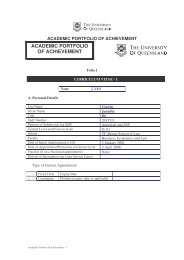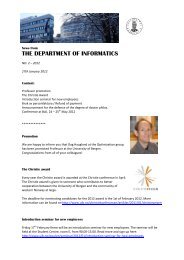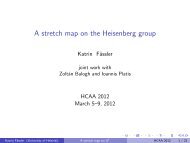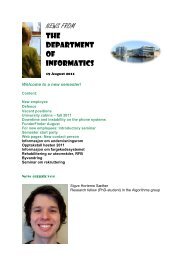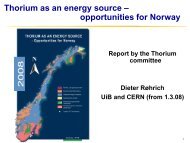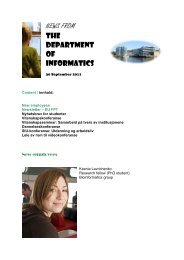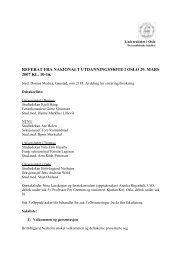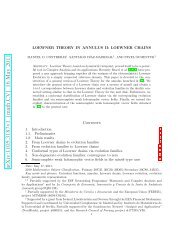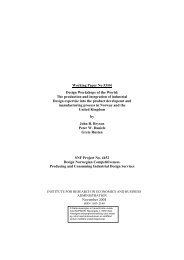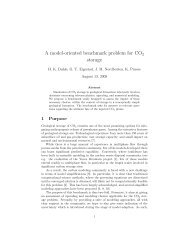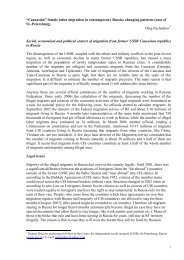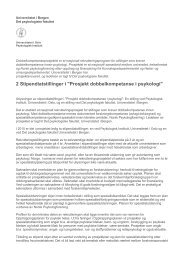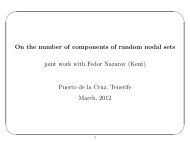THORIUM AS AN ENERGY SOURCE - Opportunities for Norway ...
THORIUM AS AN ENERGY SOURCE - Opportunities for Norway ...
THORIUM AS AN ENERGY SOURCE - Opportunities for Norway ...
Create successful ePaper yourself
Turn your PDF publications into a flip-book with our unique Google optimized e-Paper software.
Research, Development, Education and Training<br />
and energy (SAFE). The cyclotron is used in various fields of research and in isotope production<br />
<strong>for</strong> medical use in collaboration with IFE and the national hospital (Rikshospitalet HF). The main<br />
nuclear research projects, including international collaborating groups, are methods and<br />
equipment to measure data that can be used to measure nuclear reaction cross sections <strong>for</strong><br />
neutrons and <strong>for</strong> transmutation reactions. Recently a <strong>for</strong>mal cooperation with IFE has been<br />
initiated, centred on these types of projects.<br />
The research groups <strong>for</strong> material sciences at NTNU and UiO have both equipment and<br />
competence to per<strong>for</strong>m relevant material studies <strong>for</strong> nuclear systems and safety.<br />
In general, <strong>Norway</strong> today has few advantages in the field of nuclear energy, and is totally<br />
dependent on international cooperation. Cooperation within the OECD Halden Reactor Project is<br />
a possible starting point, but it is critically important to have other <strong>for</strong>mal contacts with the<br />
international society.<br />
Calculations and tests indicate that the Canadian heavy water reactor C<strong>AN</strong>DU is close to<br />
producing as much U-233 from thorium as it consumes. Today somewhat more than 40 heavy<br />
water power reactors are operating in the world, of which about twenty are located in Canada. It<br />
is reasonable to assume that the competence within IFE, Halden could be used <strong>for</strong> relevant tests<br />
and model calculations in a possible further development in this area. Development of a reactor<br />
and a fuel cycle where the production of U-233 is at least as high as the consumption is a<br />
prerequisite to use thorium efficiently in a reactor. Regardless of which reactor type is chosen, it<br />
will be necessary to reprocess the spent fuel to achieve this goal.<br />
Despite the fact that <strong>Norway</strong> has no commercial nuclear power plant, there is much competence<br />
in <strong>Norway</strong> concerning safety. This is partly due to the safety philosophy that has characterized<br />
the constructions in the North Sea, and the experience gained from accidents in the area.<br />
Furthermore, the OECD Halden Reactor Project is an important actor in the field of nuclear<br />
safety, both through the ongoing fuel research at the reactor, and through studies of the interplay<br />
between humans and technology in advanced laboratories where the effect of different systems<br />
and operator aids in simulated accident scenarios can be evaluated. The usefulness of the work<br />
within the Halden Reactor Project can be seen at Kola, where the safety of the Russian reactors<br />
has been significantly improved with the assistance of the Project.<br />
Det Norske Veritas (DNV) and Scandpower Risk Management have relevant know-how in the<br />
fields of risk analysis, safety improvements and safety culture.<br />
Research within nuclear chemistry, radiochemistry and radiation protection is per<strong>for</strong>med by<br />
several groups at NTNU, UiO and UMB. This research includes measurements and analysis of<br />
background radiation from natural and from man made sources; the use of radiation in several<br />
fields; and basic research on the interaction of ionizing radiation with biological systems on the<br />
molecular level. The latter is also related to medical use of radiation and has an important impact<br />
on the advancement of dosimetry and safety regulations.<br />
In addition, radioecology is a key research field at UMB, where environmental impact and risks<br />
associated with manmade and naturally occurring radionuclides are assessed.<br />
11.5 Education in Nuclear Technology<br />
The renewed interest in nuclear energy has promoted important ef<strong>for</strong>ts in nuclear education in<br />
many countries. This means that Norwegian students can obtain suitable education at several<br />
locations.<br />
99



